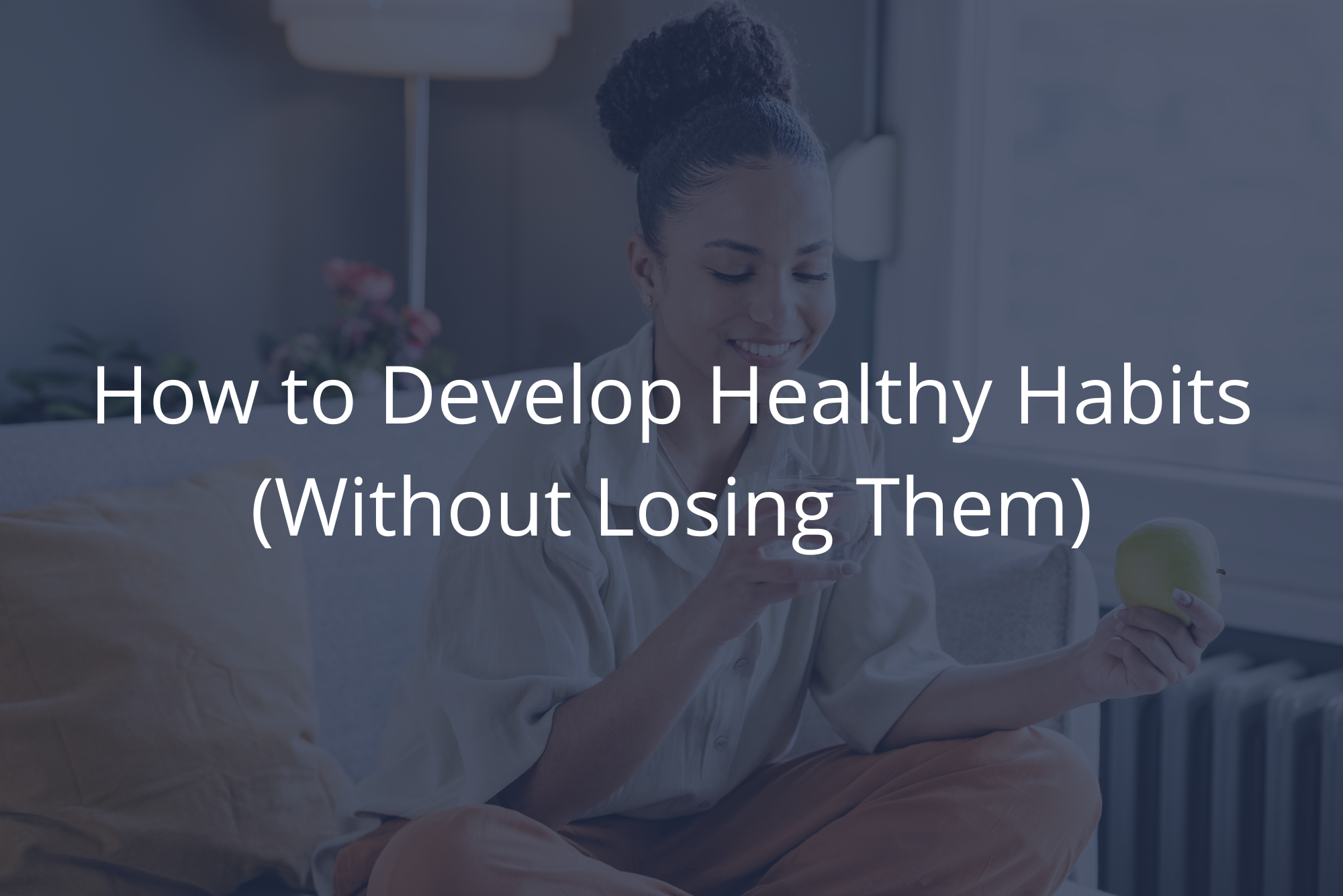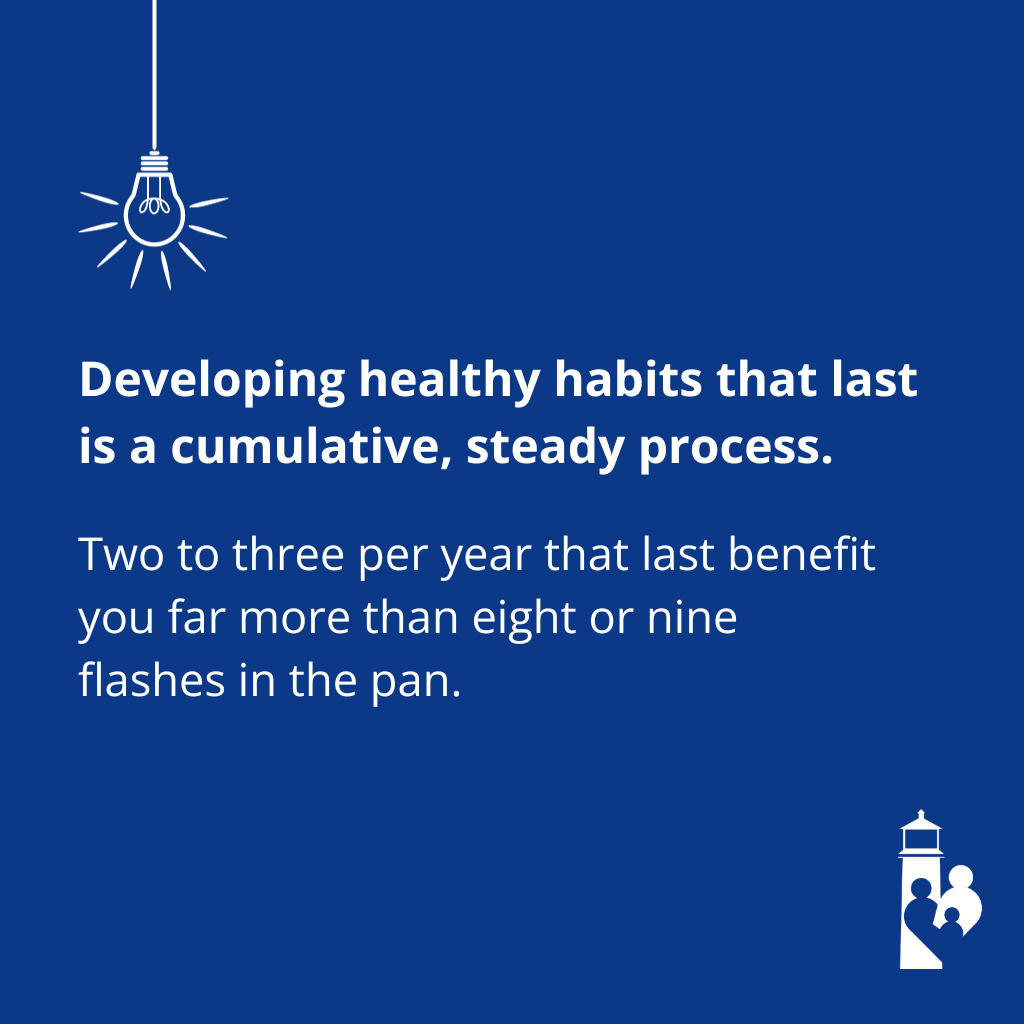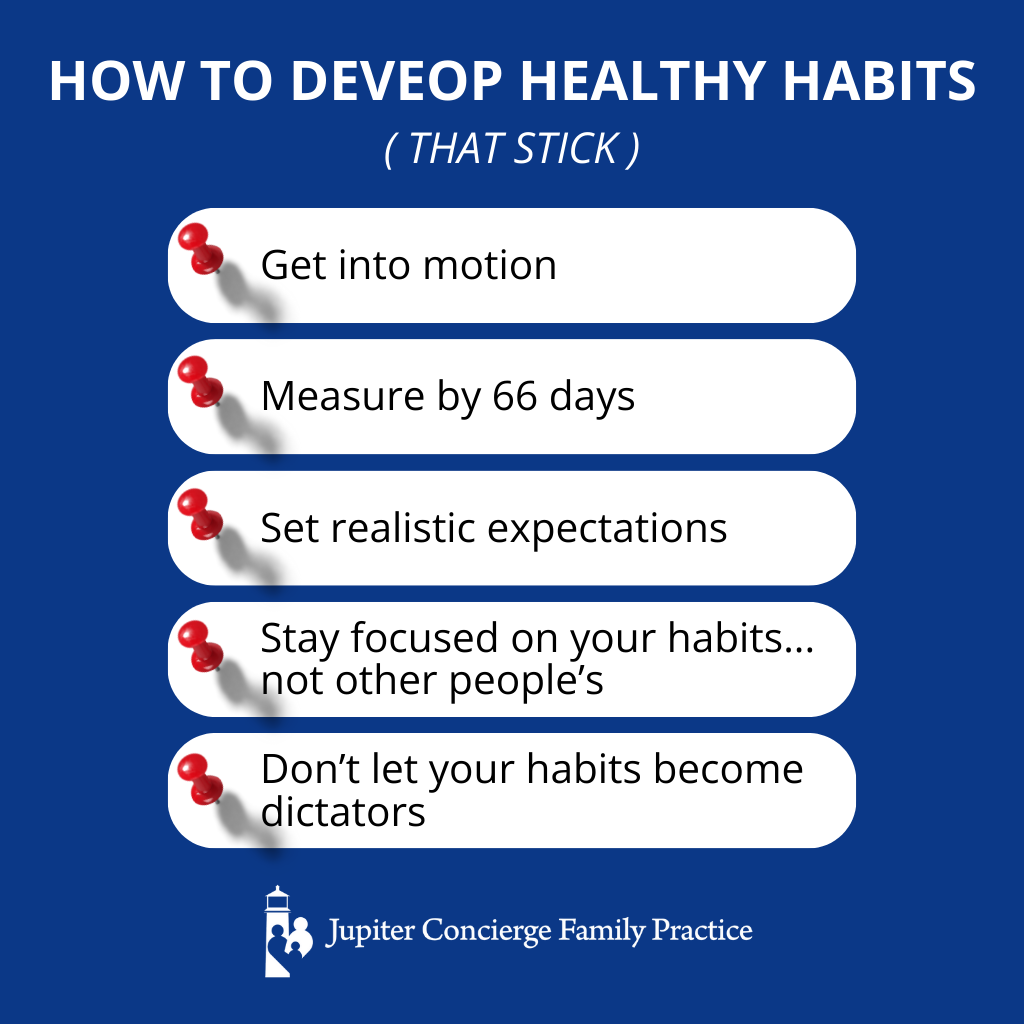
We all know that the younger we are when we start saving money, the more time our money has to grow. That’s how compounding interest works.
The same concept applies to habits related to your health. When you develop good habits, you increase your capacity to develop even more good habits, and those habits synergistically benefit one another. The same is true of bad habits. Bad habits lead to more bad habits.
Let’s look at some concrete examples of this in real life, followed by a discussion of habit types and how to develop healthy habits that last.
How Habits Beget Habits
The Positive
When you’re a small child, you start brushing your teeth. Let’s say you’re into it. At first, your parents have to brush for you, but once they’ve ensured your chompers are clean, they let you take a turn. They give you a little timer to keep track of your sessions. As you get older, you increase the time you spend brushing your teeth until you’re up to that dentist-recommended two minutes.
Somewhere along the line, you become capable of flossing, so you add that to the routine. Your good habits have snowballed into even better habits, and your oral health gets the benefit.
The Negative
Now, let’s look at the flip side. Let’s say every day when you get home from work, you have a glass of wine to relax. This takes the place of other activities that could accomplish the same goal, such as taking a walk. Walking is a great way to decompress and eliminate the day’s stress.
Drinking alcohol, although it may seem like a way to unwind, actually puts more stress on your system. It also makes you more tired; once you drink that glass of wine, you’re unlikely to get back up and go for a walk, or move about much at all.
So you see how good begets good and bad begets bad. Habits can become milestones that transition us into different stages of our day. They help us plan less and enjoy more.
Where to Develop Healthy Habits
The types of habits I recommend people cultivate are all derived from the Four Pillars of Health (SENSE): Sleep, Exercise, Nutrition, and Stress Elimination.
Let’s take them pillar by pillar.
Sleep Habits
The first habit to develop is sleeping enough. We don’t want to let exhaustion determine when we go to sleep. If we wait for exhaustion, we’re probably not getting enough sleep.
Sleep depends on a rhythm throughout the whole day. This is what’s called circadian rhythm, and it likes us to go to sleep at the same time each night and wake up at the same time each morning. This predictability helps our bodies’ physiology run properly in the middle of the night, supports our immune system, and keeps us focused and energetic during the day.
Adjusting and cultivating your sleep hygiene is one powerful tactic — and fully within your control — for developing good sleep habits.
Exercise Habits
After you get into the habit of exercising, you feel it when you skip out. There’s a distinct sense of something missing that should be there. You feel less energetic.
If you’re working on developing (or maintaining) an exercise habit, skipping a day is the worst thing you can do. If you’re legitimately pinched for time, or slightly under the weather, don’t skip completely — just do a lighter workout. Reducing the exercise load and maintaining the habit is far better in the long run than skipping and disrupting the habit outright.
Exercise has other benefits, too: it provides opportunities for social interaction, and it offers a break from our work routines. It elevates all the other pillars, augmenting their benefits.
Nutrition Habits
If we could all have a boring, planned breakfast, a boring, planned lunch, and allow dinner to be more creative, we’d all be much healthier. We’d eat more regularly, gain less weight, and have fewer physiologic problems.
When meals are a habit, we have less worry and labor in planning. We become more efficient, and meals run more on autopilot.
For example, I’ve developed a habit of packing leftovers from dinner for lunch the next day. My food is ready without thought or decision-making during my short lunch window, and I can spend the majority of the time relaxing and digesting.
Dinner, certainly, can be more experimental, and more of a social interaction with family or friends. This can be a time when we prepare a home-cooked meal, or eat out (without eating badly).
Stress Elimination Habits
Stress elimination is one of the hardest things to develop into a habit, but thinking about our core values can help. You may have numerous core values, but I recommend clearly defining and focusing on the top three. Then, use those values to evaluate your choices.
Any time we act in misalignment with our deepest values — with who we are — we cause inner turmoil, or stress. Developing a habit, therefore, of making each decision commensurate with your core values helps to eliminate stress from your life.
Another way to get into a habit of stress elimination is to listen to your body. That means noticing how you feel and what it’s connected to. For example, some symptoms — such as headache, upset stomach, and neck pain — are often stress-induced. This means these symptoms are signposts, guiding you to what you need to eliminate.
Knowing your triggers will help you eliminate the stressors that can be removed. We can’t eliminate every stressor, but we can begin to learn when to not “catch the ball.”
For example, if you’re busy at work and someone asks you to complete yet another task, stop and consider:
- What project am I working on?
- Is this task more important?
- Who’s asking me?
If it’s your boss asking, but you don’t have time to complete your existing work and the new task, ask questions. Here’s what I’m working on. Here are my time constraints. What would you like me to prioritize?
You don’t always have to “catch the ball.” Learning to ask questions or say no when appropriate can save you from the stress of juggling too much.
How to Develop Healthy Habits That Stick
Now that we’ve run through good habits as they relate to the Four Pillars of Health, let’s talk about the brass tacks of formulating — and keeping — these good habits. Here are my top tips on how to develop healthy habits and make them stick.
1. Get into motion.
Momentum is critical to successful habit development because things in motion stay in motion. When you’re doing something, the easiest thing to do is to keep doing it. The hardest thing to do is change — which is why people don’t like it.
Imagine driving an ATV through a mud patch. If you’re on a four-wheeler going through a muddy stretch, the last thing you want to do is take your foot off the accelerator. If you do, you’re stuck in the mud.
Similarly, if you’re in a groove or routine, you don’t want to break it — because you might get stuck. Starting again is hard. For example, illness disrupts our routine and, especially if we don’t already have a strong habit formed, it can be quite difficult to restart even after we’re well.
When you stop a routine, you lose that accumulated momentum and begin to develop new momentum in the wrong direction. Restarting the habit again means change, which is difficult.
The key is to have a habit, do it all the time, and let it carry you through.
2. Measure by 66 days.
One way to develop healthy habits is by introducing accountability, and trackers are very simple tools that can help. Using a calendar or a spreadsheet, check off a box for every day you complete your new habit. The average time it takes for a solid habit to form is 66 days, so a tracker for that length of time is ideal.
I recommend a particular 66-day tracker spreadsheet for habit development, an idea from The One Thing, a book I recommend by Gary Keller. The general premise of the book is to identify the one thing you can do such that other things become less necessary or unnecessary. This is what a good habit does.
3. Set realistic expectations.
One way to help your habits stick around is to set realistic expectations. Consider the types of habits you want to adopt. Remember that various aspects of our lives are associated with happiness — personal growth, spirituality, health, family, social, career, and finances — all of which include habits.
I recommend considering your priorities and selecting two to five new habits to work on per year, sticking to a maximum of one per category. Don’t add another habit until the previous one is established. Many times, our downfall occurs when we attempt to create too many habits at once.
Keeping the scope of your habit small, at least at first, can contribute to success as well. For example, deciding to walk for 45 minutes every day is a rather lofty goal, but walking for five minutes per day is relatively simple. If you’re rushed in the morning, you can fit it in at lunch or after dinner.
Five minutes per day may not give you cardiovascular health, but it will successfully ingrain your new habit. And as you enjoy hitting that minimum consistently, you’ll likely add time as you go.
4. Stay focused on your habits… not other people’s.
Just like in other spheres of life, keep your eyes on your own business. Work on developing your healthy habits; don’t get distracted by other people’s, and don’t let your habits interfere with other people’s lives.
Living under the same roof as other people doesn’t mean your habits must be the same. Let’s say your new habit is going to be a really, really healthy diet, but the people around you eat poorly. Focus on your good habit, not on their bad habit. Be aware of your attitude, and don’t make other people feel bad about their choices.
5. Don’t let your habits become dictators.
Remember to hold your habits firmly, but not rigidly. It’s okay to modify your habits or take small breaks. For example, if you’re devoted to exercise but you’ve scheduled a vacation that’s supposed to be a time to kick back, don’t let your habit interfere with what’s going on with the bigger picture.
Developing Healthy Habits: Final Thoughts
When we want to see a change in our lives, it’s tempting to do something drastic. We may try to change many things at once or one thing dramatically. But when it comes to habits, recall the wisdom of the tortoise: slow and steady wins.
Developing healthy habits that last is a cumulative and steady process. Two to three per year that last benefit you far more than eight to nine flashes in the pan.
Bear in mind that most people do two or three habits per decade; with two or three per year, you come out well ahead of the curve.

Dr. David Rosenberg
Dr. Rosenberg is a board-certified Family Physician who obtained a BS in Chemistry at Georgia's Mercer University in 1983 and a medical degree from the University of Miami in 1988. He completed his residency in Family Medicine at The Washington Hospital in Washington, Pennsylvania, in 1991 and then practiced Emergency Medicine at Palm Beach Gardens Medical Center for two years. In 1993 he started private practice in Jupiter.
Dr. Rosenberg has been married to his wife Mary for 38 years and they have three grown children together. Some of his interests include being a huge baseball fan, sailing, snow skiing, self-development, and learning to play piano.


